- Home
- Elmore Leonard
LaBrava Page 9
LaBrava Read online
Page 9
“What I’m curious about—guy applies for a job, you ask him if he’s ever been arrested, don’t you?”
“I did I’d be in violation of your federal law, invasion of privacy. I can’t ask if the guy was ever a mental patient either. I can ask him, have you ever been convicted of a felony, or have you ever committed one and didn’t get caught? But I can’t ask him if he’s ever been arrested.”
“You did issue him a handgun.”
“They buy their own.”
“So he’s got a license.”
“You apply, you want to be an armed guard, you gotta get clearance through the FBI and the State Department of Law Enforcement. The guy—it takes months—he gets his license or he gets a certified letter in the mail saying he’s turned down. But they don’t notify me, ever.”
“Have you seen his license?”
“Yeah, he showed it to me.”
“Then he must be clean, uh? They checked him out.”
Joe Stella said, “You ready for a drink now?”
LaBrava nodded. “Sounds good.”
He watched Joe Stella push up from his desk. The man moved with an effort to get a bottle of Wild Turkey and glasses from a file cabinet, ice and a can of Fresca from a refrigerator LaBrava had thought was a safe. Pouring double bourbons with a splash of Fresca Joe Stella said, “First one today. What time is it? Almost ten-thirty, that’s not bad. Long as you had breakfast.” He handed a drink to LaBrava and sat down with the bottle close to him on the desk.
LaBrava took a good sip.
“Nice drink, huh?”
“Not bad.”
“Refreshing with a little bite to it.” Joe Stella took down half his drink. Poured another ounce or so of bourbon into it, and added a little more. He said, “Ahhh, man . . .”
“I bet he’s been arrested,” LaBrava said, “but never convicted, uh?”
Joe Stella said, “Richie’s from upstate. Some of the boys here call him Big Scrub when he’s in a good mood, call him Big Dick he’ll grin at you. Otherwise nobody talks to him. You understand the type I mean?”
“I know him,” LaBrava said.
“He was arrested up there, you’re right, for destruction of government property. The son of a bitch shot an eagle.”
“I understand he ate it,” LaBrava said.
“I wouldn’t be surprised. Richie’ll eat anything. He’ll drink almost anything. He came to work here he gave me a half gallon of shine with peaches in it, whole big peaches . . . That’s a good drink, isn’t it?”
“Nice.”
“He shot the eagle he was living up around Ocala, the Big Scrub country. Richie was a canoe guide, he’d take birdwatchers and schoolteachers back in the swamp, show ’em nature and come out somewhere up on the St. Johns River. He wasn’t doing that he’d run supplies for a couple of moonshiners, few hundred pounds a sugar a trip. These two brothers he knew had a still in there. So when he got busted for the eagle he traded off, gave the feds the two brothers and they got two to five in Chillicothe. I asked him, didn’t it bother him any to turn in his friends? He says, ‘No, it weren’t no hill to climb.’ “ Joe Stella drank and topped it off again, the color of his drink turning clear amber in the window sunlight. “No, it weren’t no hill to climb. He’s around here more’n ten minutes I start to sound like a fucking cracker.” Joe Stella took another drink and sat back. “You ever hear of Steinhatchee?”
“Sounds familiar.”
“Way up on the Gulf side, where the Steinhatchee River comes out. Sleepy little place, the people there, they cut timber for Georgia-Pacific or fish mullet outta the river, use these skiffs they call bird-dog boats, make ten thousand a year, top. Till they saw their first bale of marijuana and found out they could make ten thousand a night—buy it offa shrimp boats’d come in there and wholesale it. These hardshell Baptists, all of a sudden they’re getting rich in the dope business. They never smoked it, you understand, they just ran it. Well, Richie Nobles had a relative living over there and found out about it. So what do you think Richie does?”
“If he got rich,” LaBrava said, “I know he didn’t declare it.”
“No, Richie believes marijuana is for sissies. But it bothers him these people that don’t know shit’re making all that money. So he tells the DEA and they send him in, see if he can join the business.”
“Professional snitch,” LaBrava said.
“Kind you people love, huh?” Joe Stella said. “Once he was in tight there, part of the deal, the feds wired him. Richie comes back with enough to bust all his new friends. Testified against ’em in Jacksonville federal court, change of venue to protect his ass, and put enough on his own rela-tive, some cracker name Buster something, to send him up to Ohio for thirty-five years. Second flop’s the long one, the first time the guy only drew three.”
“What’s Richard get out of it?”
“Enemies. He knows anything he knows how to piss people off.” Joe Stella hesitated, about to drink. He stared over the rim of his glass. “None of that’s familiar?”
“Why would it be?”
“You don’t know an old guy name Miney, huh? Miney”—looking over his desk, picking up a scrap of notepaper—“Combs. Father of Buster Combs, the one was sent up.”
“Don’t know ’em,” LaBrava said.
“See, you’re not the first one come looking for Richie. He’s a popular boy.”
“I can see why.”
“This old guy was in here, talk just like Richie. He’s the one told me about Steinhatchee. I asked Richie—it was only like a week ago—if it was true. He says, ‘Yeah, I done more’n one favor for my Uncle Sam.’ “
LaBrava said, “So he left the Big Scrub, came down here to work . . .”
“Came down to Dade with a federal recommendation, wanting to join the police. Miami and Dade-Metro he says wouldn’t even talk to him. He was a gypsy cop for a while, worked for Opa-locka, Sweetwater, Hialeah Gardens, got fired for taking bribes, one thing or another, and came to work for me.”
“Where’s he live?”
“Same thing the old guy asked. I don’t know. I never was able to reach him on a number he gave me. A woman’d answer and say, ‘No, he ain’t here and I hope I never see the son of a bitch again.’ Words to that effect, they’d say it different ways and hang up.”
“Any of the women sound . . . older or educated, like they were well off?”
“I don’t know how well off, I know they were pissed off.”
“Why’d you keep him on?”
“I thought I explained it, Christ, try and get help aren’t all misfits or retirees, old geezers . . . You want another drink? I think I’ll have one.”
“No, I’m fine.”
Joe Stella pushed up to get himself another ice cube and the can of Fresca, stumbled against the desk as he came back and sat down again. “I think you laid a smoke screen on me. You aren’t with the IRS, are you? . . . Gimme that Windy City shit, I bet you never even been to Chicago.”
“I passed through it once,” LaBrava said, “on my way to Independence, Missouri. It looked like a pretty nice town.”
“Passed through it . . . You know, I was thinking,” Joe Stella said, pouring. “Guy like you—I could fire three of my dumbbells, pay you twelve bucks an hour and give you just the cream, supervisory type work. What would you say to that?”
10
* * *
AGAIN HE EXPERIENCED the strange sense of time. Having lunch on the front porch of the Cardozo Hotel with a movie star out of his memory. She wore dark glasses, round black ones, and a wide-brimmed Panama straight across her eyes. He watched her.
He watched her take dainty bites of marinated conch, raising the fork in her left hand upside down, her moves unhurried. He watched her break off a piece of French bread, hold it close to her face, elbow resting on the table, wrist bent, staring out of shade at the ocean in sunlight, then slowly bring the piece of bread to her mouth, not looking at it, and he would see her lips part to rece
ive the bread and then close and he would see the movie star’s masseter begin to work, still unhurried. He wasn’t sure where the masseter was located, Franny hadn’t told him that. Franny said the movie star used some kind of secret cream, placenta tissue extract, and very likely said Q and X with exaggerated emphasis in front of mirrors and wore sunglasses till sundown so she wouldn’t get squint wrinkles. His gaze would shift briefly from Jean Shaw and he would see:
Franny sitting on the wall in the strip of oceanfront park across the street, taking Polaroid shots of the hotels. Franny in cutoffs cut so high they must be choking her.
Della Robbia women in lawn chairs talking about Medicare and Social Security.
Maurice coming along Ocean Drive with a grocery sack, skinny legs, faded yellow shorts that reached almost to his knees.
Cars with tourists passing slowly, sightseeing.
A young Cuban guy talking to Franny now. The guy fooling with his ear, Franny laughing. The guy posing, hand on his hip, seductive, strange, as Franny aimed her Polaroid at him.
And his eyes, behind his own sunglasses, would slide back to the movie star’s face, pale but in full color. The skin was smooth, without a trace of what might appear to be a tuck, a lift. He believed it didn’t matter even if she’d had one. He believed he was in love with her face.
She would turn her head to him and seem to smile, used to being looked at. He wanted to see her eyes but would have to wait.
She said, “You know, that’s a lovely shirt.” Then surprised him, lowered her sunglasses to the slender tip of her nose, letting him see in daylight a line beneath each of her eyes, slightly puffed, a look that he liked, a slight imperfection. She replaced her glasses as she said, “I don’t believe I’ve ever called a man’s shirt lovely before, but it is. I love hibiscus.” She said, “I almost married a man who wore only dark brown shirts and always with a dark brown necktie. Odd? . . . Maybe not. He made three thousand dollars a week as a screen writer, he kept an apartment at the Chateau Marmont and died of malnutrition.” She said, “I want to see more of your work, I think it’s stunning. Will you show me?”
He said, “I want to photograph you.”
“I’ve been photographed.”
“Maybe you have . . .”
Maurice said, “Well well well,” on the street side of the stone-slab porch railing, stepping up on the base to look at their table. “What’re you having, conch? You ever see it they take it out of the shell? You wouldn’t eat it. Gimme a bite.” He lowered the grocery sack to the railing and leaned over it, face raised waiting as Jean Shaw speared a piece of conch and offered it.
“Another? You can have the rest, I’m finished.”
“I don’t want to wreck my appetite. We’re eating in tonight, fried steak and onions, railroad-style. Gimme a sip—whatever it is.”
She offered her glass. “Plain old Scotch.”
“How many you had?”
She looked at LaBrava. “How many, six, seven?”
Maurice said, “It’s three o’clock in the afternoon!”
“We’ve had two, Maury. Don’t have a heart attack.” In that quiet, unhurried tone. He left them and she said, “Do you like his shorts? They have to be at least twenty years old. He may be the most eccentric guy I know. And I’ve known a few, I’ll tell you.”
“Well, he’s different,” LaBrava said.
He saw Franny, alone now, farther down the beach . . . Paco Boza coming along the sidewalk in his wheelchair, a ghetto blaster in his lap; it looked like an accordion.
“Joe, when you’re as well off as Maury and you choose to live in a place like the Della Robbia, that’s eccentric.”
“He said he used to have money, but I don’t know that he has that much now.”
She said, “Oh,” and paused.
He said, “That was my understanding. Had it and spent it.” He could hear Paco’s blaster now, turned up all the way. “In fact the other night, he was telling me when he sold the hotel next door, the Andrea, he could’ve kicked himself for not waiting, get a better price.”
She said, “Does he confide in you?”
“I wouldn’t say he confides.”
“But you’re close. I know he likes you, a lot.”
“Yeah, we get along. We argue all the time, but that’s part of the routine.”
“He’s an actor, Joe. He plays the crabby but loveable retired bookie, hangs out at Wolfie’s, Picciolo’s, all those places from the old days.”
“That’s his age—he lives in the past.”
“He’s a fox, Joe. Don’t ever sell him short.”
He wanted to say, Wait a minute, what’re we talking about exactly? But now Paco Boza was rolling toward them, his ghetto box playing soul against his body, Paco letting it run up through his shoulders and down his arms to turn the silver wheels of the wheelchair wired to the beat, no hurry or worry in the world.
“Hey, the picture man. When do I get my pictures, man?”
LaBrava told him maybe in a few days. Maybe sooner. Come back when you’re not busy.
Paco Boza left them, taking his sound down the street, soul with a kick that got into LaBrava sitting there in his sunglasses drinking Scotch with a movie star on the porch of the Cardozo Hotel.
She said, “The poor guy. He’s so young.” He told her there was nothing wrong with Paco. He had stolen the chair from Eastern Airlines, had his girlfriend push him out of Miami International in it because he didn’t like to walk and because he thought it was cool, a way for people to identify him. She said, “What does he do?” and he told her about two-hundred-dollars worth of cocaine a day. She said, “You’re part of this, you feel it.” She said, “I love to watch you. You don’t miss anything, do you?” He did not move or speak now. Close to him she said, “You think you’re hidden, but I can see you in there; Mr. LaBrava. Show me your pictures.”
“At Evelyn’s gallery they sip wine and look at my photographs . . .”
Looking at them now spread over the formica table, Jean Shaw picking up each print and studying it closely—in his rooms on the second floor of the Della Robbia. 201. He paid for the rooms, he had been living here eight months, but there was nothing of him in the rooms. They were rooms in a hotel. He had not got around to mounting or hanging any of his prints, or was sure there were any he cared to look at every day. There were other prints in envelope sleeves in the bookcase and among magazines on the coffee table. He told her Aperture magazine had contacted him about doing a book. Call it South Beach. Get all the old people, the art deco look. He was working on it now. No, he was thinking about it more than he was working on it. He wanted to do it. He wouldn’t mind having a coffee-table book on his coffee table. It seemed strange though—ask thirty or forty dollars for a book full of pictures of people who’d never see it, never be able to afford it.
“At the gallery they sip wine and look at my pictures. They say things like, ‘I see his approach to art as retaliation, a frontal attack against the assumptions of a technological society.’
“They say, ‘His work is a compendium of humanity’s defeat at the hands of venture capital.’
“They say, ‘It’s obvious he sees his work as an exorcism, his forty days in the desert.’ Or, another one, ‘They’re self-portraits. He sees himself as dispossessed, unassimilated.’
“The review in the paper said, ‘The aesthetic sub-text of his work is the systematic exposure of artistic pretension.’ I thought I was just taking pictures.”
Jean Shaw said, “Simplicity. It is what it is.” Then paused. “And what it isn’t, too. Is that what you’re saying?”
He didn’t want her to try so hard. “I heard one guy at the gallery—it was his wife or somebody who said I was dispossessed, unassimilated, and the guy said, ‘I think he takes pictures to make a buck, and anything else is fringe.’ I would’ve kissed the guy, but it might’ve ruined his perspective.”
Jean Shaw said, studying a print, “They try to pose, and not knowing how they
reveal themselves.”
He liked that. That wasn’t bad.
“Your style is the absence of style. Would you say?”
He said, “No tricky angles,” because he didn’t know if he had a style or not. “I’m not good at tricky angles.”
“Some of them look like actors. I mean like they’re made up, costumed.”
“I know what you mean.”
“When you’re shooting them, what do you see?”
“What do I see? I see what I’m shooting. I wonder if I have enough light. Or too much.”
“Come on. Tell me.”
“I see ‘images whose meanings exceed the local circumstances that provide their occasion.’ “
“Who said that?”
“Walker Evans. Or somebody who said he did.”
“What do you think about when you look at your own work?”
“I wonder why I can’t shoot like Stieglitz.”
“How long have you been doing it?”
“Or why I’ll never be able to. I wonder why my people don’t look at me the way August Sander’s people looked at him. I wonder if I should have moved in closer, taken one step to the right or left.”
There was a silence.
“What else do you see?”
“But it isn’t what I see, is it? It’s what I wonder when I look at the picture. I wonder if I’ll ever have enough confidence.”
She said, “Yes? What else?”
“I wonder, most of all I wonder what the people are doing now. Or if they’re still like that, the way I shot them.”
He heard her say, in the quiet afternoon apartment, “What do you see when you look at me?”
And almost answered, turning from the table of black and white prints. Almost. But as soon as he was facing her, close to her, he knew better than to speak, break the silence and have to start over. No, they were now where they wanted to be, if he could feel or sense anything at all. So he touched the face he had watched on the screen, bringing up one hand and then the other just before he brought his mouth to hers and felt her hands slide over his ribs.

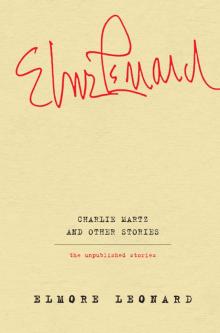 Charlie Martz and Other Stories: The Unpublished Stories
Charlie Martz and Other Stories: The Unpublished Stories Elmore Leonard's Western Roundup #2
Elmore Leonard's Western Roundup #2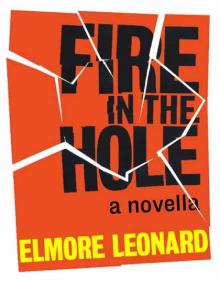 Fire in the Hole
Fire in the Hole Tishomingo Blues (2002)
Tishomingo Blues (2002)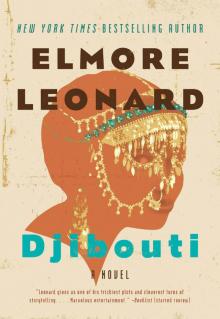 Djibouti
Djibouti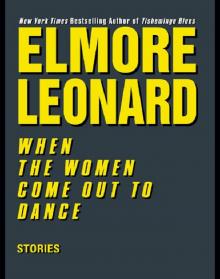 When the Women Come Out to Dance: Stories
When the Women Come Out to Dance: Stories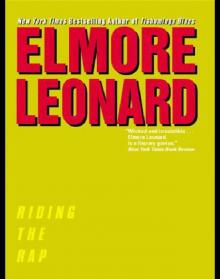 Riding the Rap
Riding the Rap Moment of Vengeance and Other Stories
Moment of Vengeance and Other Stories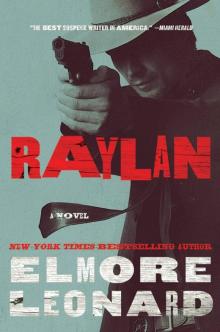 Raylan
Raylan Touch
Touch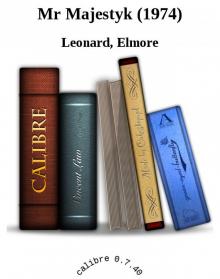 Mr Majestyk
Mr Majestyk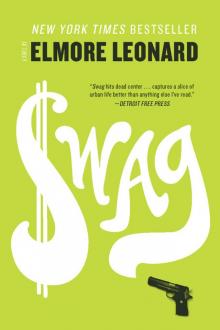 Swag
Swag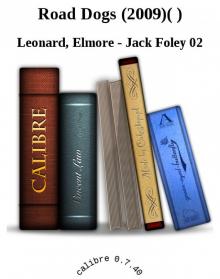 Road Dogs
Road Dogs La Brava
La Brava The Hot Kid
The Hot Kid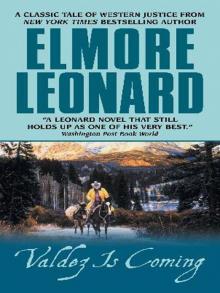 Valdez Is Coming: A Novel
Valdez Is Coming: A Novel Be Cool
Be Cool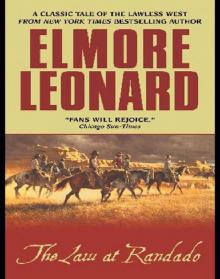 The Law at Randado
The Law at Randado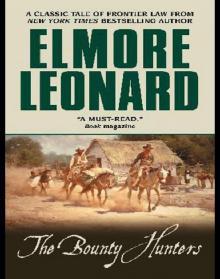 The Bounty Hunters
The Bounty Hunters When the Women Come Out to Dance
When the Women Come Out to Dance 310 to Yuma and Other Stories (1953)
310 to Yuma and Other Stories (1953)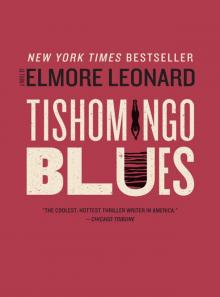 Tishomingo Blues
Tishomingo Blues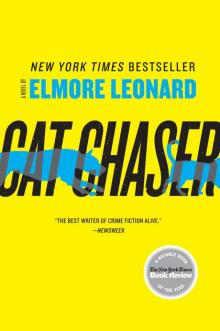 Cat Chaser
Cat Chaser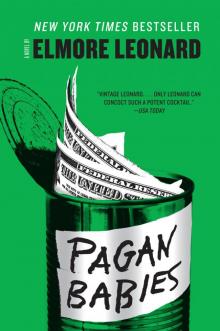 Pagan Babies
Pagan Babies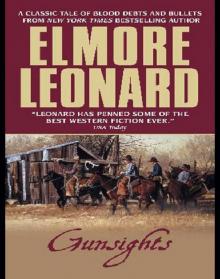 Elmore Leonard's Western Roundup #1
Elmore Leonard's Western Roundup #1 52 Pickup
52 Pickup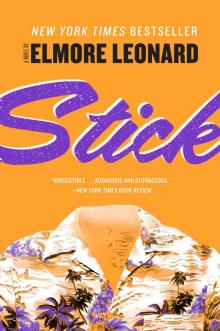 Stick
Stick The Moonshine War
The Moonshine War Valdez Is Coming
Valdez Is Coming City Primeval
City Primeval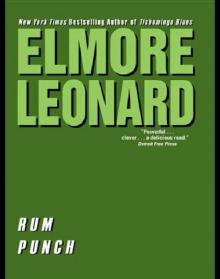 Rum Punch
Rum Punch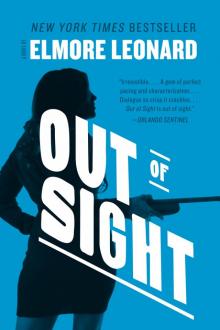 Out of Sight
Out of Sight Naked Came the Manatee (1996)
Naked Came the Manatee (1996)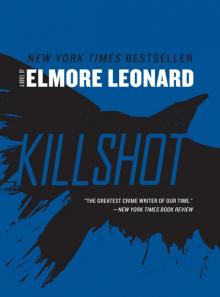 Killshot
Killshot Cuba Libre
Cuba Libre Forty Lashes Less One
Forty Lashes Less One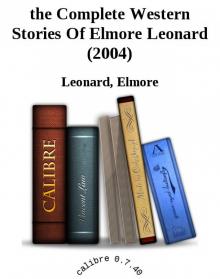 The Complete Western Stories of Elmore Leonard
The Complete Western Stories of Elmore Leonard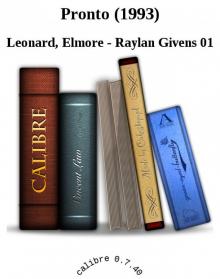 Pronto
Pronto Split Images
Split Images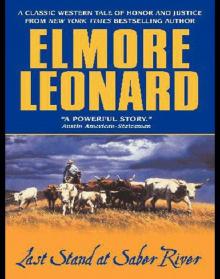 Last Stand at Saber River
Last Stand at Saber River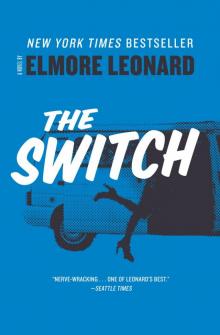 The Switch
The Switch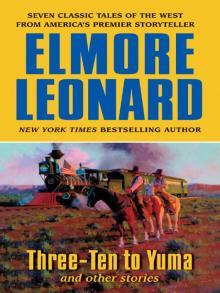 Three-Ten to Yuma and Other Stories
Three-Ten to Yuma and Other Stories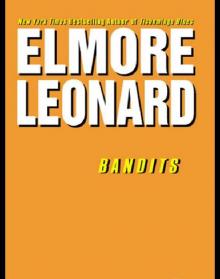 Bandits
Bandits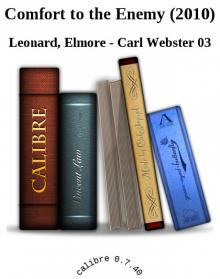 Comfort to the Enemy and Other Carl Webster Stories
Comfort to the Enemy and Other Carl Webster Stories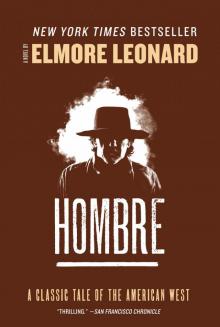 Hombre
Hombre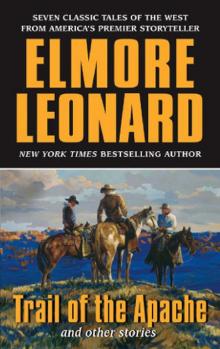 Trail of the Apache and Other Stories
Trail of the Apache and Other Stories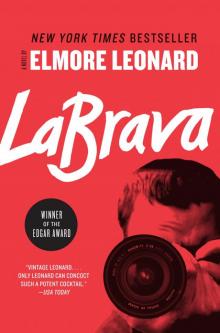 LaBrava
LaBrava Gold Coast
Gold Coast Jackie Brown
Jackie Brown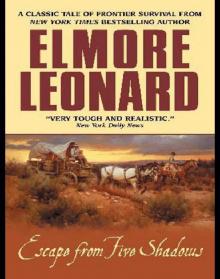 Escape From Five Shadows
Escape From Five Shadows Karen Makes out (1996)
Karen Makes out (1996)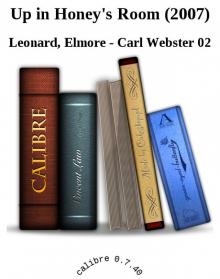 Up in Honey's Room
Up in Honey's Room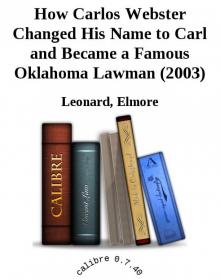 How Carlos Webster Changed His Name to Carl and Became a Famous Oklahoma Lawman (2003)
How Carlos Webster Changed His Name to Carl and Became a Famous Oklahoma Lawman (2003)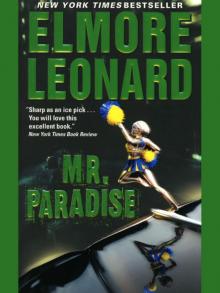 Mr. Paradise
Mr. Paradise The Hunted
The Hunted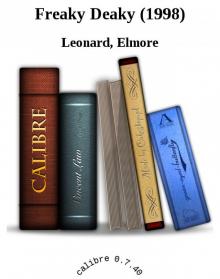 Freaky Deaky
Freaky Deaky Louly and Pretty Boy (Ss)
Louly and Pretty Boy (Ss)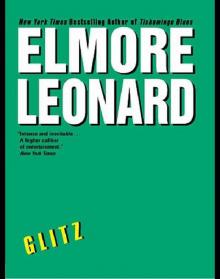 Glitz
Glitz A Coyote's in the House
A Coyote's in the House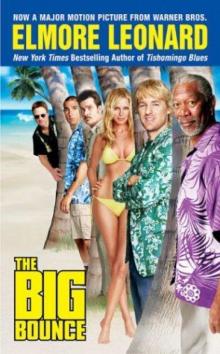 The Big Bounce jr-1
The Big Bounce jr-1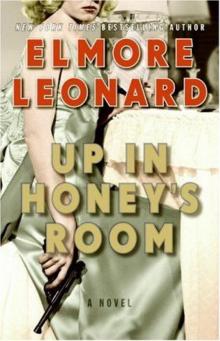 Up in Honey's Room cw-2
Up in Honey's Room cw-2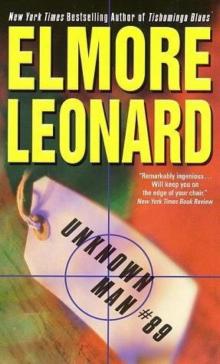 Unknown Man #89 jr-3
Unknown Man #89 jr-3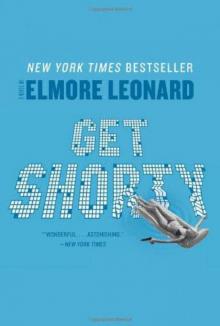 Get Shorty: A Novel cp-1
Get Shorty: A Novel cp-1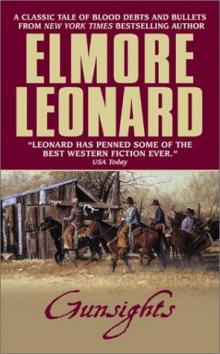 Gunsights
Gunsights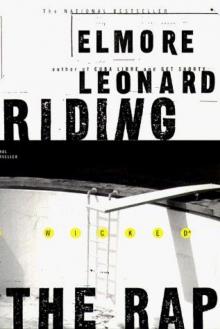 Riding the Rap rg-2
Riding the Rap rg-2